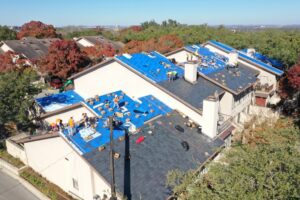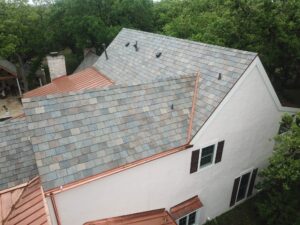Roof Life Expectancy Based on Types of Roofs
The average life span of your roof indicates how long it will continue to protect your home. One factor that impacts the life expectancy of your roof is the quality and type of roofing material. All roofs are made to be durable and protect your home from the elements, but not all roofing materials have the same life span.
Life Spans of Different Types of Roofs
With proper maintenance and adequate installation, a roof should function optimally until it nears the end of its life expectancy. Here is how long each type of roof lasts.
Asphalt Shingles
Asphalt shingles are one of the most common roofing materials used for residential roofing in the United States. This roofing type has an average life span of 15 to 20 years.
Wood Shingles
Wood shingles are made from natural wood materials such as cedar or yellow pine. A wood shingle roof can last 25 to 30 years.
Metal Roof
Metal roofs come in a variety of different metals, panel types and panel thicknesses, which all play a role in the life span of the roofing. On average, aluminum roofs can last for 60 to 80 years, while copper roofs can last 90 to 150 years.
Slate Tiles
Slate tiles are a resilient roofing material with a unique style. Many homeowners choose slate for their homes because of its long-lasting quality. The average life span of slate tiles is over 100 years.
Concrete or Clay Tiles
Concrete or clay tiles are incredibly strong and durable. You can expect this traditional roofing material to last 50 to 100 years.
Composite Shingles
Composite shingles are mostly synthetic and made of a variety of common roofing materials. The life expectancy of this roof type is around 50 years.
How to Make Your Roof Last Longer
There are several factors outside of your control, like the weather, that impact the life expectancy of your roof. Fortunately, there are a few things you can do to extend the life of your roof:
- Clean your gutters: Debris, leaves and dirt can clog your gutters and cause water to pool on your roof, leading to water damage. Ensure that your gutters are cleaned at least twice a year or whenever debris is visible so rain can flow freely from the roof and away from your home.
- Get regular inspections: Regular roof inspections conducted by an expert roofer will help you detect any issues before they cause severe damage that may lead to the need for roof replacement.
- Make repairs right away: If you do detect any damage, whether minor or severe, it’s important to have the roof repaired immediately as it will only get worse over time.
Contact Us for All Your Roofing Needs
At Tridom Roofing, we offer expert roofing services to handle various kinds of roofing projects. When you need a reliable roofer for quality roof repairs or replacements, trust our team of roofing specialists to get the job done. Call us at 832-627-2745 today!



